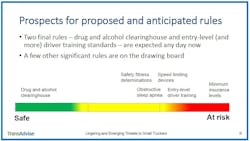Analyst: Driver training rule, speed limiters, GHG 2 'at risk'
While a wholesale rollback of trucking regulations under the incoming Trump administration is unlikely, an anticipated moratorium on those still under development—and the time it will take to restaff the Dept. of Transportation with Republican appointees—will put a couple of pending major rules in long-term limbo, an industry consultant suggests. The new Congress could also get into the act, taking immediate advantage of a legislative window of opportunity to undo federal policy implemented late in the Obama administration, including the regulation of greenhouse gases.
“Here’s where the election matters substantially,” said TransComply President Avery Vise, speaking on a Stifel conference call Monday. “Any rule that is not in effect as of Inauguration Day is subject to being, basically, vitiated.”
Both the drug and alcohol clearinghouse rule and the entry-level driver training standards have cleared White House review but have not been published—therefore, “pending the fine print” and given the 60-day waiting period for a major federal rule to be enacted after first appearing in the Federal Register, neither will be in force before Trump takes office Jan. 20.
While Vise anticipates the clearinghouse rule will be “safe,” the federal training standards program is very much “at risk”—as are several other policy initiatives in the works.
“There’s very little that is less partisan than the anti-drug issue,” Vise said. “I don’t think there will be anything in the final rule that will warrant it being reversed. But everything other than [the clearinghouse rule] is probably less than 50% likely to happen.”
Specifically, according to Vise:
Congressional review
But even an enacted final rule “is not safe,” Vise added, as Congress can withhold funding for enforcement. Additionally, the Congressional Review Act empowers lawmakers to pass a “resolution of disapproval” within 60 legislative days—possibly exposing rules enacted as far back as June. Because such a resolution is subject to Senate reluctance as well as a presidential veto, the review act is seldom used, he noted.
“There is one substantial rule that affects trucking that would be covered, and that is the greenhouse gas rule by the Environmental Protection Agency,” Vise said. “Most observers expect that’s going to be one of the rules that gets overturned.”
The electronic logging device (ELD) mandate, to take effect in December 2017, however, will remain. Basically, undoing established rules requires another rulemaking, and that’s typically a long, difficult process—especially for a rule, such as ELDs, that has substantial backing within trucking.
And while Republicans now control the White House and both houses of Congress, the “razor-thin margin” in the Senate means trucking industry interests will have to pick their political battles carefully.
“Especially when it comes to something that might be perceived as being soft on safety, we could find it difficult to change the law,” Vise said.
He also pointed out the bureaucracies typically will defend their turf, regardless of the party in charge.
“FMCSA tends to reach for as much authority and flexibility as it can get,” Vise said. “We also have many of the same people at the top. Bureaucrats do matter; that does lead to inertia.”
Still, a slowdown in rulemakings can be expected with any change in administration, Vise concludes. He anticipates that Obama political appointees—including FMCSA Administrator Scott Darling—will resign their posts when Trump takes office, with ranking civil servants taking on leadership duties in the interim.
“We’re looking at quite a while before anything gets done. Frankly, that was going to happen anyway because the two rules that are ready to be published are the only thing in the pipeline,” Vise said. “I think we’re looking at the first half of next year to be responding to emergency-type situations.”
About the Author
Kevin Jones 1
Editor
Kevin has served as editor-in-chief of Trailer/Body Builders magazine since 2017—just the third editor in the magazine’s 60 years. He is also editorial director for Endeavor Business Media’s Commercial Vehicle group, which includes FleetOwner, Bulk Transporter, Refrigerated Transporter, American Trucker, and Fleet Maintenance magazines and websites.

